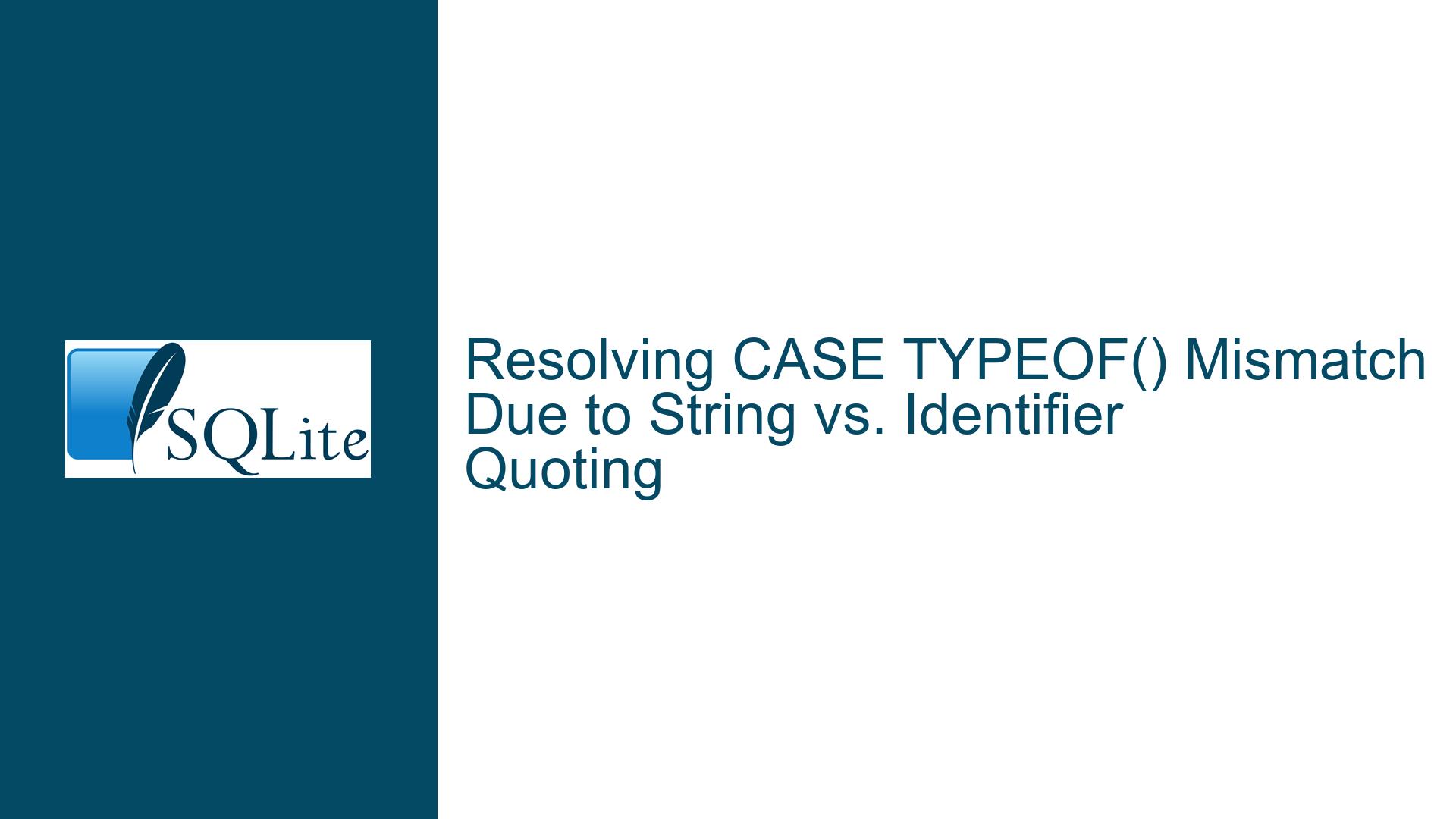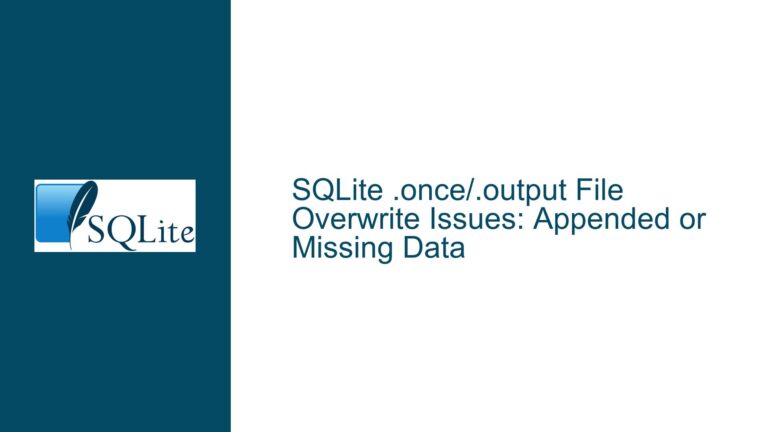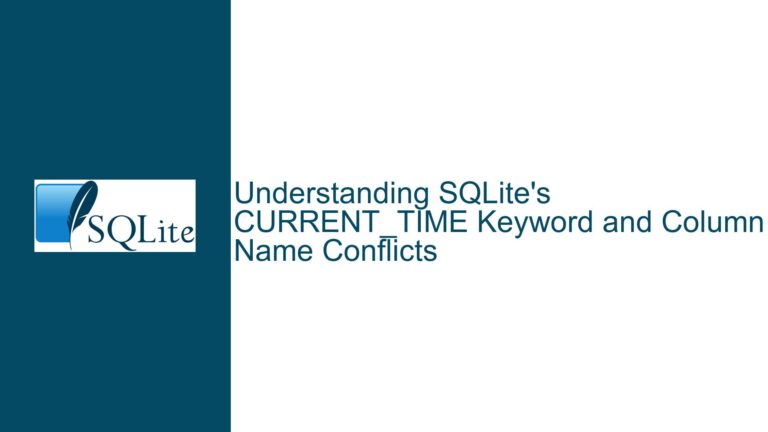Resolving CASE TYPEOF() Mismatch Due to String vs. Identifier Quoting
Issue Overview: Unexpected CASE Behavior with TYPEOF() and Column Names
The core issue involves unexpected results when using a CASE expression to evaluate the output of TYPEOF(column) against the string "text". A column named text containing textual data fails to trigger the WHEN "text" condition, returning unexpected instead of expected. This occurs despite TYPEOF(text) explicitly returning the string "text" in the query output. The discrepancy arises from SQLite’s parsing rules for quoted terms and the interaction between column names and string literals.
In the provided example, the CASE expression attempts to compare the type of the text column (which holds string values) against the term "text". The first CASE branch fails because "text" is interpreted as an identifier reference to the column itself, not as a string literal. The second CASE branch concatenates ">" with TYPEOF(text), forcing SQLite to treat ">text" as a string literal, which matches correctly. This inconsistency highlights SQLite’s dual use of double quotes for both identifiers and string literals, depending on context, and the importance of column naming conventions.
Possible Causes: Identifier Ambiguity and Quoting Misapplication
Double Quotes for String Literals Instead of Identifiers
SQLite follows the SQL standard where double quotes (") enclose identifiers (e.g., table/column names), while single quotes (') denote string literals. When"text"is used in theWHENclause, SQLite first attempts to resolve it as an identifier. If a column namedtextexists,"text"refers to that column’s value, not the string'text'. This leads to a logical mismatch: theCASEexpression compares the type of the column (e.g.,TYPEOF(text) = 'text') against the value of the column (e.g.,text = 'text'). Since the column contains phrases like"this is some text", the comparisonTYPEOF(text) = "text"becomes'text' = 'this is some text', which evaluates to false.Column Name Conflicts with Type Names or Keywords
Naming a columntextcreates ambiguity when"text"appears in a query. Whiletextis not a reserved keyword in SQLite, its use as a column name increases the risk of misinterpretation in contexts where type names or string literals are involved. This is exacerbated when double quotes are misapplied, as the parser may prioritize identifier resolution over literal interpretation.SQLite Version-Specific Parsing Behavior
Although not explicitly confirmed here, older SQLite versions may exhibit subtle differences in how quoted terms are resolved. The original example uses SQLite 3.38.0, which adheres strictly to the identifier-first parsing rule. In some cases, developers might have relied on SQLite’s "forgiveness" in treating unmatched identifiers as string literals, but this behavior is not guaranteed across versions.
Troubleshooting Steps, Solutions & Fixes
Step 1: Correct Quoting Practices
Replace all instances of double quotes (") used for string literals with single quotes ('). In the original query, the WHEN "text" clause should be rewritten as WHEN 'text' to ensure the term is interpreted as a string literal. For example:
SELECT TYPEOF(text),
CASE TYPEOF(text) WHEN 'text' THEN 'expected' ELSE 'unexpected' END,
CASE '>'||TYPEOF(text) WHEN '>text' THEN 'expected' ELSE 'unexpected' END
FROM MyTable;
This adjustment forces SQLite to treat 'text' as a string, ensuring the comparison TYPEOF(text) = 'text' evaluates correctly.
Step 2: Avoid Ambiguous Column Names
Refrain from naming columns after SQLite type names (text, integer, blob, etc.) or keywords, even if they are not reserved. Rename the text column to a non-conflicting name like content or description:
CREATE TABLE MyTable (
id INTEGER,
content TEXT
);
INSERT INTO MyTable VALUES (1, 'this is some text');
INSERT INTO MyTable VALUES (2, 'this is more text');
This eliminates parsing ambiguity and improves query readability.
Step 3: Validate Identifier Resolution with Explicit Syntax
Use the quote() function or || operator to debug how SQLite interprets quoted terms. For example:
SELECT TYPEOF(text), '"text"' AS quoted_term,
quote("text") AS identifier_resolution
FROM MyTable;
If identifier_resolution returns values from the text column (e.g., 'this is some text'), it confirms that "text" is being treated as an identifier. Conversely, quoted_term will always return the string '"text"'.
Step 4: Test with Bracket-Quote Hybrid Syntax
In scenarios where column names must conflict with type names, use bracket-quote syntax to disambiguate:
SELECT TYPEOF([text]),
CASE TYPEOF([text]) WHEN 'text' THEN 'expected' ELSE 'unexpected' END
FROM MyTable;
This explicitly signals that [text] is an identifier, though renaming the column remains the preferred solution.
Step 5: Review SQLite Parsing Documentation
Consult SQLite’s official documentation on lexical structure and quoted identifiers to reinforce proper quoting practices. Key takeaways:
- Double-quoted terms are identifiers unless no matching identifier exists, in which case they become string literals.
- Single-quoted terms are always string literals.
- Backticks (
`) and square brackets ([]) are alternative identifier quoters.
Step 6: Version-Specific Validation
Test queries across SQLite versions to identify parsing differences. Use the sqlite_version() function to check the runtime version:
SELECT sqlite_version();
If legacy systems rely on lenient parsing, consider migrating to standardized quoting practices to ensure forward compatibility.
Step 7: Utilize Static Analysis Tools
Integrate SQL linters or IDEs with syntax validation (e.g., DBeaver, SQLiteStudio) to flag misapplied quotes. These tools often highlight double-quoted strings that could be interpreted as identifiers, providing immediate feedback during development.
Step 8: Educate Teams on SQLite Quoting Nuances
Conduct workshops or code reviews focusing on:
- The distinction between identifiers and literals.
- Risks of using type names or keywords as column names.
- Cross-version compatibility considerations.
Final Solution
The root cause of the CASE mismatch lies in the dual use of double quotes for both the text column identifier and the intended string literal 'text'. By adhering to single quotes for literals and renaming ambiguous columns, the query logic aligns with SQLite’s parsing rules, yielding correct results. For the original example, the corrected query becomes:
SELECT TYPEOF(text),
CASE TYPEOF(text) WHEN 'text' THEN 'expected' ELSE 'unexpected' END,
CASE '>'||TYPEOF(text) WHEN '>text' THEN 'expected' ELSE 'unexpected' END
FROM MyTable;
This returns the expected output:
text|expected|expected
text|expected|expected
Preventative Measures
- Adopt a project-wide style guide mandating single quotes for literals and consistent identifier quoting (e.g., backticks).
- Use static analysis in CI/CD pipelines to catch quoting errors early.
- Document database schema decisions, especially column naming conventions, to prevent future conflicts.






